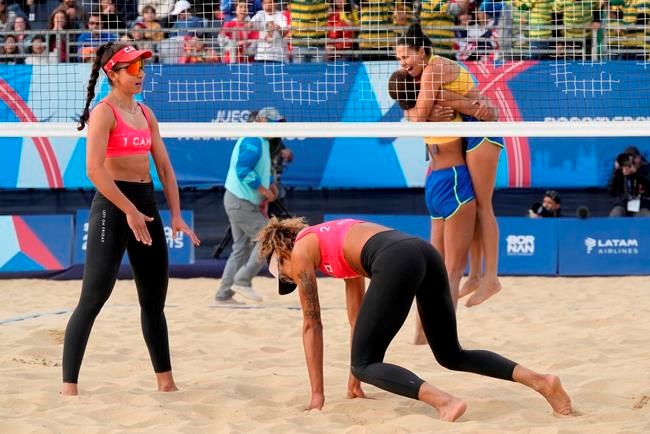SANTIAGO — Melissa Humana-Paredes and Brandie Wilkerson believe their new bond on and off the beach volleyball court strengthened at the Pan American Games.
A year after the former university indoor volleyball teammates formed a beach partnership, the Toronto duo won Canada's first Pan Am Games medal in women's beach volleyball with a silver Friday.
Humana-Paredes and Wilkerson fell 2-0 (22-20, 22-18) to world No. 1 Ana Patricia Silva Ramos and Eduarda "Duda" Santos Lisboa of Brazil at the suburban Beach Volleyball Centre with the Andes mountains as its backdrop.
Canada's Jody Holden and Conrad Leinemann claimed men's beach gold in 1999 when the sport made its Pan Am Games debut in Winnipeg.
Humana-Paredes and Wilkerson, both 30, reached the quarterfinals of Olympic Games with different partners two years ago in Tokyo. The two women have climbed to a world ranking of No. 5.
"We got what we came here for which was multi-sport experience, more high-level games, more opportunity to play together and compete," Wilkerson said. "I mean, it's been a year now. We need these touches, we need these opportunities."
The Pan American Games were not an Olympic qualifier and don't count toward world rankings.
The Canadian women were at the tail end of a long season, including the world championship in Mexico a week before arriving in Santiago, Chile and carrying the Maple Leaf into the opening ceremonies.
But the Pan Am Games in Santiago were near and dear to Humana-Paredes' heart. Her mother Myriam Paredes-Blaise and father Hernan Humana were born in Chile and survived the Augusto Pinochet dictatorship from 1973 to 1990.
Wilkerson agreed to slot the Pan Am Games into their schedule meant a lot to her teammate.
"That last two weeks have been riddled with emotions," Humana-Paredes said. "Representing Canada, holding the flag, playing in front of my Chilean family for the first time, being back in Chile after almost a decade, there's just so many things I haven't quite processed yet.
"I'm just proud and so grateful of what we were able to accomplish this week together and gain more experience together as a team. We made some history for Canada and to play in front of my family is always really special. And I didn't ever think I'd have the opportunity to do it here in Chile, of all places, and have my Chilean family watch me for the first time."
Santiago also represented a multi-sport Games dress rehearsal for Humana-Paredes and Wilkerson as they set their sights on the 2024 Olympic Games in Paris next summer.
Wilkerson made her Pan Am Games debut in Santiago. Humana-Paredes competed in the 2015 Games in Toronto with Taylor Pischke and placed fourth.
"Multi-sport games, they definitely push you to your limits," Humana-Paredes said. "I think it's important that we have this experience together and we come out of this stronger, we come out of this closer, we come out of this with a lot of learnings.
"It's been a very long season. I know we're tired. The week also can drag on a little bit when you're just waiting to play. I think our team did such a great job of staying with it and taking what we can from it and putting it into action for the next multi-sport Games we play next summer."
The pair will compete in December's World Tour Finals in Qatar, where the top eight womens' teams will square off.
While defence is the Canadians' strength, the left-handed Wilkerson gives them unique attacking options. She often hits the ball off a defensive dig by Humana-Paredes instead of setting up her teammate for a kill.
"I think having a lefty on the right side is an extreme strength. I can just pop it up to her and she can take it down, which happens a lot," Humana-Paredes said. "It's one of our strengths. You can see the teams are never ready. We catch them off guard that way.
"It definitely opens up our game. I think that's something we really want to explore. You see it happening a lot more on the World Tour, the two-ball offence, but not everyone is a lefty."
This report by The Canadian Press was first published Oct. 27, 2023.
Donna Spencer, The Canadian Press



